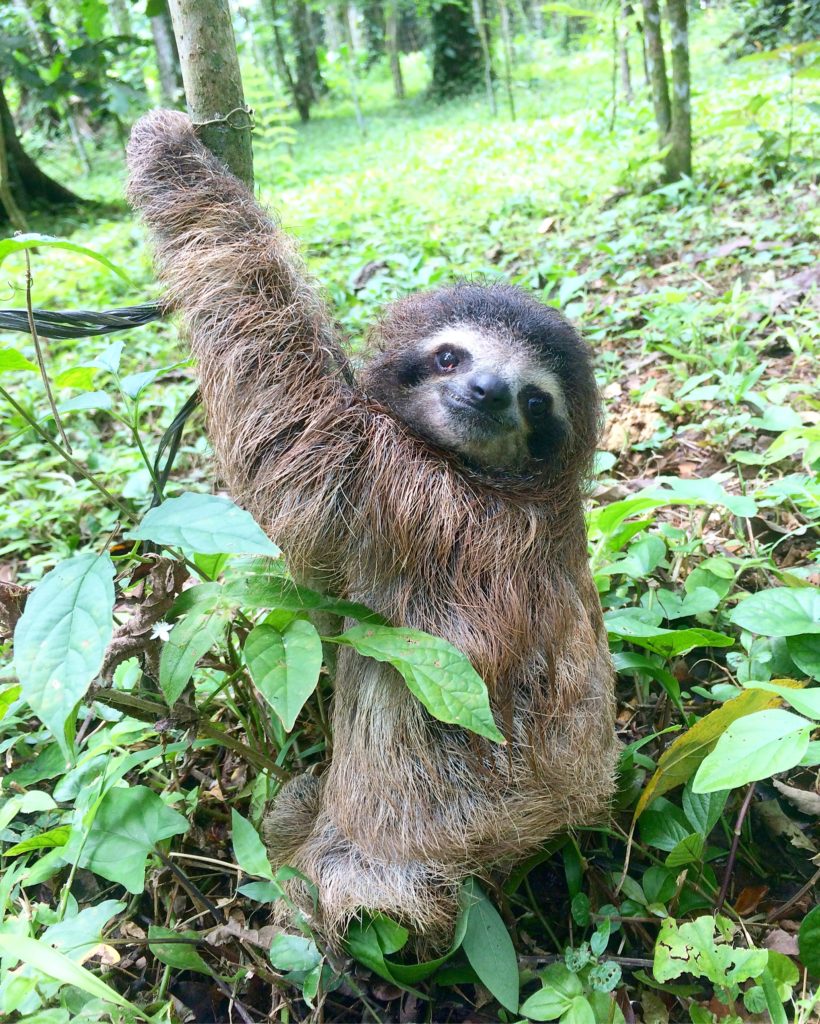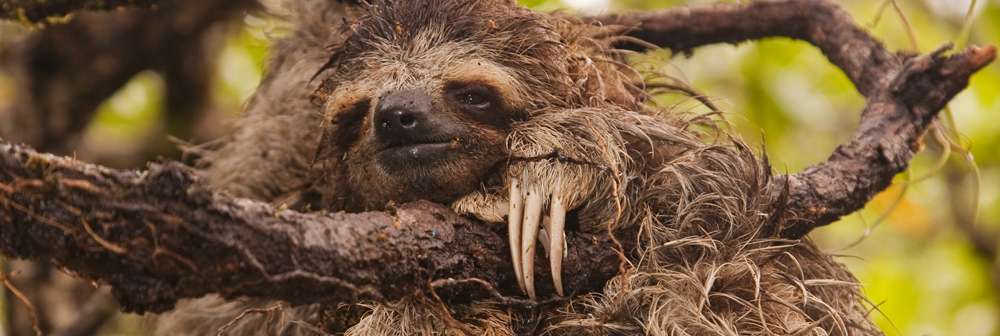The cute little babe pictured above is a two-toed sloth, of which there are two species belonging to the Megalonychidae family. The four species of three-toed sloths, on the other hand, are part. The sloth is an adorable animal native to Central and South America. They sleep most of the day away, and when they're awake, they're very slow (to put it lightly). With their round heads, tiny ears, and expressive eyes, it's hard not to love them. Here are the cutest sloth gifts available for.
Slow down with the sloths at the Louisville Zoo!
Linnaeus’s two-toed sloths are here at the Zoo! 2-year-old male sloth Sebastian and 2.5-year-old female sloth Sunni are getting acclimated to their new surroundings. They are waiting to meet you in the South America zone. Hang out with one of the most elusive and fascinating creatures on the planet and hear from the keepers who care for them. More information will be coming in the following weeks including upcoming opportunities for a sloth meet and greet
(special ticket required — expected cost $95 per person, does not include Zoo admission. Features of the experience will be announced soon. Features will NOT include holding the sloths.)
Notify me when the Sloth Experience goes on sale!
Thanks so much for your interest in our upcoming sloth exhibit and meet and greet experience! Currently, all behind-the-scenes experiences and tours are delayed due to the COVID-19 crisis.
We are still working out the details for dates, times and other details of the experience. Right now, we are planning for the experience to occur several times each week once behind-the-scenes tour resume. An additional ticket will be required for the experience. When we have more detailed information, it will be released here and on our social media channels! In the meantime, you can also sign up below to be among the first notified once the experience is available for full registration.
_Jorge_Salas_International_Expeditions.JPG?1394634201)
This exhibit is made possible through the Friends of the Louisville Zoo and other generous donors.

About Linnaeus’s Two-Toed Sloths
This arboreal mammal hails from the South America forest canopy. Sloths are nocturnal, solitary and known for their slow movements as well as their tendency to hang upside down in trees. In fact, these sloths eat, sleep, mate and even give birth in this position!
Although commonly referred to as two-toed sloths, did you know that all sloths actually have three toes on their hind legs? The fingers on their front limbs are what differs between species; some sloths have three fingers and some have two!
Two-toed sloths are also a bit larger, reaching 31 inches in length and weighing up to 24 pounds. They have long, brown hair which will stand on edge when they feel threatened. The shape of these hairs allows for the growth of algae and fungi by trapping moisture. This growth can make the sloths appear green which helps to camouflage them in the rain forest canopy.
Sloths enjoy a diet of mostly leaves but will also eat flowers and fruit. Due to their slow metabolism, two-toed sloths have one of the slowest digestive rates for any mammal. Research shows it takes approximately 30 days for them to fully digest what they eat.
The sloth’s natural predators are big cats, snakes and eagles — but their largest threat is loss of habitat due to the rapidly expanding human population.

Do you love sloths? |
Finding everything to do with sloths has never been easier. Whether you are looking for a new sloth plush, sloth appeal or some cute sloth pictures we have you covered. Don’t be too slow, these limited edition items won’t stay long!Learn More > |
Jerry Kirkhart CC BY 2.0 Via Flickr
Sloths are slow-moving, fascinating creatures that inhabit the tree tops of the jungles in South America. They are rapidly gaining popularity due to their perceived “chill persona” and strange attributes, such as their fur that hosts its own ecosystem with growing symbiotic moss. Recently, sloth rescues in Costa Rica have circulated adorable images of baby sloths wearing pajamas for medical reasons. Sloths can be cute, but they are one of the more challenging exotic pets to keep alive and thriving in captivity.
Can you own a pet sloth?
There are quite a few states where sloth ownership is legal, but finding a dealer to sell you one might be a bit difficult. Sometimes exotic pet stores sell them, which is a questionable practice, but this is extremely uncommon. Sloths are costly animals and are typically priced around $6000 for a captive-bred baby. Adult sloths are often wild-caught and inexperienced owners should avoid them at all costs. In general, sloths make poor pets for the large majority of pet owners, but a few dedicated individuals can have success if they have experience with other difficult exotic animals.

What is sloth care like?

Sloth
Only the two-toed sloth is possible to own in the United States. Three-toed sloths are the species that have black ‘tear marks’ under their eyes, and even zoos have great difficulty keeping them alive. All sloths require special temperatures and levels of humidity that must be maintained at all times. Their diet is complex and not completely understood, so the owner must do thorough research and contact zoos that are keeping them if possible. Sloths should not be kept in a simple parrot cage unless it is an extra large, double macaw enclosure that is at least 6 feet tall. Most importantly, sloths are easily stressed and can have their welfare compromised from too much handling. This brief description of their care should dissuade most people from thinking a sloth can make a good pet.
Where are sloths legal?
Sloth Facts
State laws addressing exotic or wild animal possession frequently change and if you are serious about getting a sloth, you should find out if they are legal for sure. This is a list of states where sloths are probably legal, based on the limited information available. Unfortunately, even state workers can provide false information, so finding out the truth can frustrating. You will have to check not only with your state, but your county, city or town, and neighborhood association if you live in one.
- Alabama This state has pretty lax laws and even tigers may be legal (a few other animals like deer aren’t), so sloths should be okay.
- Florida Sloths are definitely legal in Florida if you get a permit for a Class 3 animal. This permit is no-cost and pretty simple to acquire, so there is no issue in that. Luckily, many smaller exotic animals are legal with a permit in this state.
- Indiana Indiana is a state that used to ban animals like large carnivores until 2015, when that law was reversed, and it has possibly re-reversed again. But sloths should be legal as they are not regulated as dangerous wild animals.
- Kansas This state recognizes so-called dangerous wild animals but does not list smaller animals like kinkajous and sloths.
Laura Wolf CC BY 2.0 Via Flickr- Iowa This state allows captive-bred pet skunks, and possibly sloths.
- Louisiana For this state, there is a list of prohibited animals that are mostly large carnivores such as bears, wolves, and cougars. Also included are large primates, squirrels, some bigger ungulates, and skunks. There is no mention of sloths.
- Minnesota This state appears to only ban primates, big cats, and bears, which would obviously leave out sloths.
- Michigan Thankfully, Missouri appears to have little regulation for exotic pets, which would include sloths.
- Mississippi This is a state that regulates “dangerous” animals and sloths are not included.
- Montana Two-toed sloths are specifically mentioned as being an uncontrolled species, so they are definitely legal.
- Missouri So-called dangerous animals are specifically defined here and don’t include sloths, so they are probably legal.
- Nevada This state is famous for being one of the most lenient states for exotic pets where lions, bears, and elephants are technically legal. However, tiny 2 pound fennec foxes and a few native animals aren’t. However, sloths should be legal to own.
Dave Gingrich (CC BY-SA 2.0) Via Flickr- New York In this state so-called dangerous animals are specifically defined, thankfully leaving sloths out.
- North Carolina This is another state where many animals are legal, including certain bears, big cats, and giant reptiles, yet small foxes may not be (this is under dispute due to the wording of the law). Sloths are definitely legal to possess.
- Ohio While this state passed exotic pet bans after the incident in Zanesville where a mentally unstable man released his large carnivore menagerie into the streets, the ban doesn’t appear to affect certain primates and sloths.
- South Carolina This state has passed more exotic pet laws unfortunately, but pet sloths should still be legal.
- South Dakota Sloths should be legal with a veterinary certificate of inspection.
- Texas Sloths are definitely legal in this state, while large exotic carnivores and foxes are not.
- West Virginia This state has recently passed exotic pet laws that most likely do not include sloths.
- Washington Sloths do not appear to be named and are possibly legal.
Didn’t see your state on this list?
This article is a general guide and sloths may very well be legal in most states and illegal in some of the listed states. If you are serious about buying a sloth, you should also check your importation laws as sometimes an animal can be legal to own but have special requirements for importation over state lines.
Thankfully, most states do not specifically mention sloths and there is absolutely no logical reason for them to be banned in any state. These delicate animals pose very little invasive potential due to their highly specific dietary needs and sensitivity to temperatures. Only South Florida and Hawaii have a scant chance of keeping an escapee alive, but the likelihood of a sloth escaping is also rather low. Obviously, while sloths can bite, they are no public safety threat.
Sloth Pictures
The likelihood of at least two sloths escaping, surviving, and breeding is near non-existent. Sloths are very unpopular pets (with good reason) but the opportunity should exist for people who can dedicate a good portion of their life to the animal’s care.
